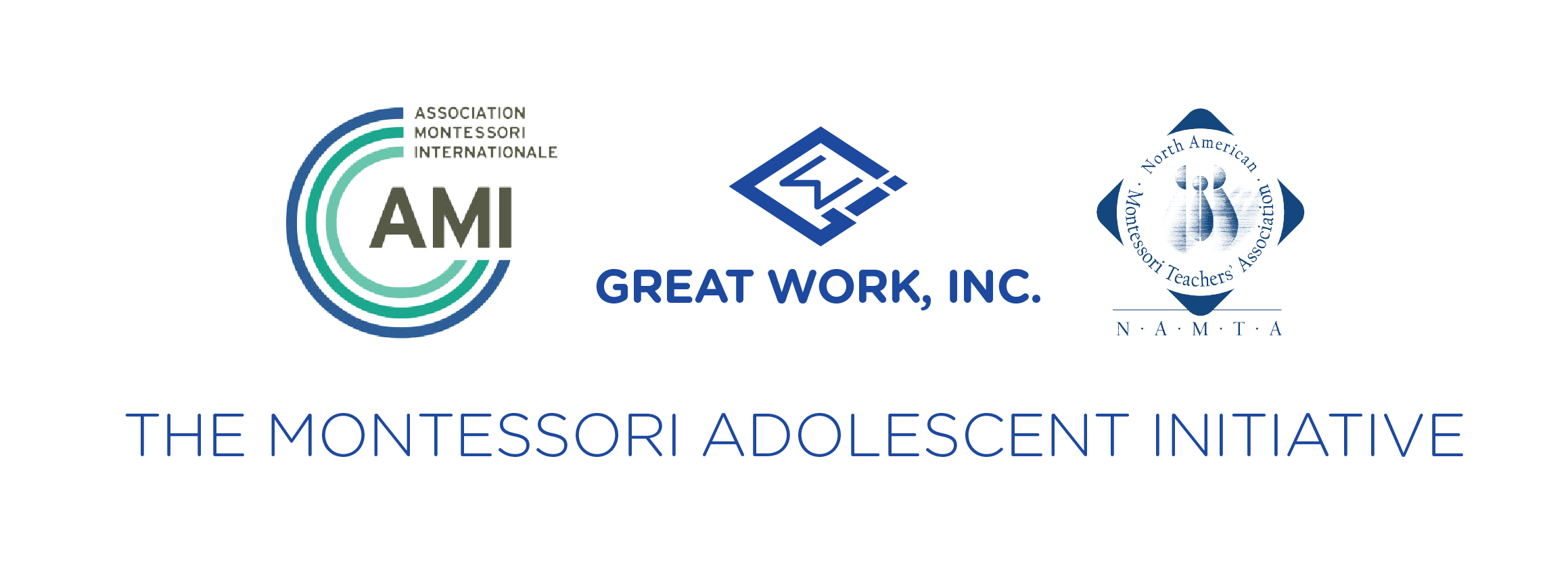Deep Dive on The Educational Syllabus
Deep Dive Summary: The Educational Syllabus
Submitted by Laurie Ewert-Krocker
The context for understanding Montessori’s intention with the Educational Syllabus that she describes in Appendix B of From Childhood to Adolescence is the framing of the adolescent’s needs in Appendix A - the mindset needed to apply the Educational Syllabus. “The plan aims above all at ‘valorization of the personality’ in the present social conditions.,” says Montessori, and she posits that the adolescent has two central needs: protection during a vulnerable time of development and understanding of the “role he will play in society.”
Work, she says, should be seen as initiation into the knowledge that is the “pride of our civilization,” and as a “product of life.”
Two other points that give significant context for the syllabus are:
“There is a need for a more dynamic training of character and the development of a clearer consciousness of social reality” (From Childhood to Adolescence, 62 Clio).
“Education should therefore include the two forms of work, manual and intellectual, for the same person…… these two kinds complete each other” (From Childhood to Adolescence, 65 Clio)
The three sections of the Educational Syllabus are not presented as content to be covered or disciplines to be studied in isolation but developmental imperatives for the adolescent:
Part One: The opening up of ways of self-expression--cultivation of self and voice
Part Two: Education in relation to psychic development: Application of the mind and creativity in developing moral character in order to work with other humans harmoniously
Part Three: Education as preparation for adult life (general education): receiving human culture and moving it forward
Part One: The opening up of ways of self-expression for the purpose of “the difficult development of the personality”
The adolescent needs to develop awareness of the qualities of being human and the discovery of what each person brings to society through their gifts of self-expression. Adolescents need to develop an inner self awareness and voice: to express what they think, what they see, what they understand, what they struggle with, what they love.
Self-expression needs an audience, other people to connect with and share appreciation of the human experience. Society as a whole is enriched by each person’s contribution and ability to freely express themselves. All of the expressions that Montessori lists (music, poetry, writing, dance, art) are languages that bridge us to and allow us to see the beauty and value in the OTHER.
Part Two: Education in relation to psychic development
Mathematics and language, as the vehicles for social interaction and human interdependency, give voice to and are avenues of moral development. Morality, the source of spiritual equilibrium, is part of everything we do in collaboration with other human beings, but for the moral development of the child and adolescent, math and language need to be both practiced and brought to consciousness. Character (the development and valorization of the personality) is the building of inner strength and connective tissue between humans which allows us to be interdependent. We become active members of society by being literate in both mathematical thinking and in languages. We are born with both of these abilities, but they need to be trained toward proficiency and moral interaction.
Part Three - Education as preparation for adult life (general education)
Part three of the Educational Syllabus provides the context for placing the human being in the universe in their time and place in history, giving them the field of activity to engage as a contributing member of society.
The study of the earth and of living things: cultivating a sense of wonder about the universe and how it works;
The study of human progress and the building up of civilization: progress as the accomplishments of human groups and cultures and their ability to create “supernature” towards a universal scientific culture;
The study of the history of mankind: a telling of the stories of people in other times and places, appreciating their discoveries, inventions, and gifts to us throughout time; a growing awareness of the forces that bring people together and integrate them (despite violence and conquest); an appreciation of the supernature of our time and our trajectory for the future.
In a time of political and economic inequity and threat to the balance of nature and supernature on the planet, Montessori’s Educational Syllabus frames our work in the context of finding a “new morality.” “Therefore, a new morality, individual and social, must be our chief consideration in this new world. This morality must give us new ideas about good and evil, and the responsibility towards humanity that individuals incur when they assume powers so much greater than those with which they are naturally endowed” (From Childhood to Adolescence 78 Clio).
